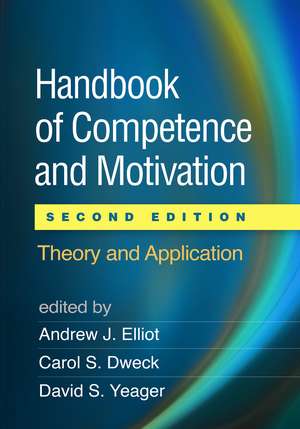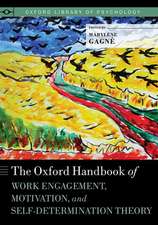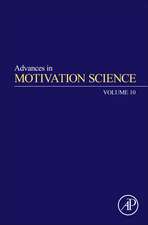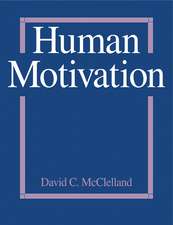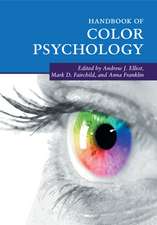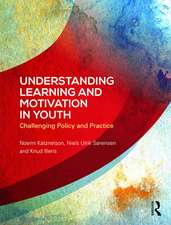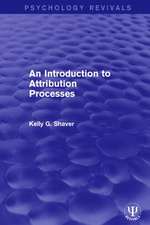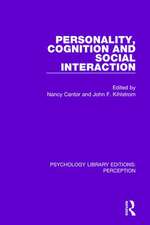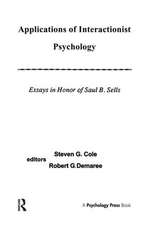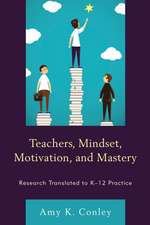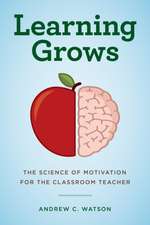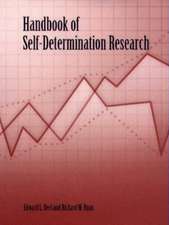Handbook of Competence and Motivation, Second Edition: Theory and Application
Editat de Andrew J. Elliot, Carol S. Dweck, David S. Yeageren Limba Engleză Paperback – 9 apr 2018
Now completely revised (over 90% new), this handbook established the concept of competence as an organizing framework for the field of achievement motivation. With an increased focus on connecting theory to application, the second edition incorporates diverse perspectives on why and how individuals are motivated to work toward competence in school, work, sports, and other settings. Leading authorities present cutting-edge findings on the psychological, sociocultural, and biological processes that shape competence motivation across development, analyzing the role of intelligence, self-regulated learning, emotions, creativity, gender and racial stereotypes, self-perceptions, achievement values, parenting practices, teacher behaviors, workplace environments, and many other factors. As a special bonus, purchasers of the second edition can download a supplemental e-book featuring several notable, highly cited chapters from the first edition.
New to This Edition
*Most chapters are new, reflecting over a decade of theoretical and methodological developments.
*Each chapter now has an applied as well as conceptual focus, showcasing advances in intervention research.
*Additional topics: self-regulation in early childhood, self-determination theory, challenge and threat appraisals, performance incentives, achievement emotions, job burnout, gene-environment interactions, class-based models of competence, and the impact of social group membership.
*Supplemental e-book featuring selected chapters from the prior edition.
New to This Edition
*Most chapters are new, reflecting over a decade of theoretical and methodological developments.
*Each chapter now has an applied as well as conceptual focus, showcasing advances in intervention research.
*Additional topics: self-regulation in early childhood, self-determination theory, challenge and threat appraisals, performance incentives, achievement emotions, job burnout, gene-environment interactions, class-based models of competence, and the impact of social group membership.
*Supplemental e-book featuring selected chapters from the prior edition.
Preț: 425.06 lei
Preț vechi: 462.02 lei
-8% Nou
Puncte Express: 638
Preț estimativ în valută:
81.34€ • 85.09$ • 67.57£
81.34€ • 85.09$ • 67.57£
Carte disponibilă
Livrare economică 12-26 martie
Livrare express 26 februarie-04 martie pentru 55.73 lei
Preluare comenzi: 021 569.72.76
Specificații
ISBN-13: 9781462536030
ISBN-10: 1462536034
Pagini: 722
Dimensiuni: 178 x 254 x 37 mm
Greutate: 1.16 kg
Ediția:2
Editura: Guilford Publications
Colecția Guilford Press
ISBN-10: 1462536034
Pagini: 722
Dimensiuni: 178 x 254 x 37 mm
Greutate: 1.16 kg
Ediția:2
Editura: Guilford Publications
Colecția Guilford Press
Public țintă
Postgraduate, Professional Practice & Development, and UndergraduateCuprins
I. Introduction
1. Competence and Motivation: Theory and Application, Andrew J. Elliot, Carol S. Dweck, & David S. Yeager
II. Central Constructs
2. Intelligence and Competence in Theory and Practice, Robert J. Sternberg
3. Achievement Motives, David E. Conroy
4. Achievement Goals, Andrew J. Elliot & Chris S. Hulleman
5. An Attribution Perspective on Competence and Motivation: Theory and Treatment Interventions, Raymond P. Perry & Jeremy M. Hamm
6. Competence Self-Perceptions, Herbert W. Marsh, Andrew J. Martin, Alexander Seeshing Yeung, & Rhonda G. Craven
7. Achievement Values: Interactions, Interventions, and Future Directions, Allan Wigfield, Emily Q. Rosenzweig, & Jacquelynne S. Eccles
8. Mindsets: Their Impact on Competence Motivation and Acquisition, Carol S. Dweck & Daniel C. Molden
9. Understanding and Addressing Performance Anxiety, Sian L. Beilock, Marjorie W. Schaeffer, & Christopher S. Rozek
III. Relevant Processes
10. Challenge and Threat Appraisals, Jeremy P. Jamieson
11. Competence Assessment, Social Comparison, and Conflict Regulation, Fabrizio Butera & Céline Darnon
12. Competence as Central, but Not Sufficient, for High-Quality Motivation: A Self-Determination Theory Perspective, Richard M. Ryan & Arlen C. Moller
13. Competence and Pay for Performance, Barry Gerhart & Meiyu Fang
14. Achievement Emotions, Reinhard Pekrun
15. The Many Questions of Belonging, Gregory M. Walton & Shannon T. Brady
16. Stereotype Threat: New Insights into Process and Intervention, Robert J. Rydell, Katie J. Van Loo, & Kathryn L. Boucher
17. Role of Self-Efficacy and Related Beliefs in Self-Regulation of Learning and Performance, Barry J. Zimmerman, Dale H. Schunk, & Maria K. DiBendetto
18. Interest: Theory and Application, Judith M. Harackiewicz & Maximilian Knogler
19. On Becoming Creative: Basic Theory and Implications for the Workplace, Carsten K. W. De Dreu & Bernard A. Nijstad
20. Motivation, Competence, and Job Burnout, Michael P. Leiter and Christina Maslach
IV. Development
21. Early Reasoning about Competence Is Not Irrationally Optimistic, Nor Does It Stem from Inadequate Cognitive Representations, Andrei Cimpian
22. Self-Regulation in Early Childhood: Implications for Motivation and Achievement, C. Cybele Raver, Katherine A. Adams, & Clancy Blair
23. Competence and Motivation during Adolescence, David S. Yeager, Hae Yeon Lee, & Ronald E. Dahl
24. Competence and Motivation at Work throughout Adulthood: Making the Most of Changing Capacities and Opportunities, Jutta Heckhausen, Jacob Shane, & Ruth Kanfer
25. Motivational Factors as Mechanisms of Gene–Environment Transactions in Cognitive Development and Academic Achievement, Elliot M. Tucker-Drob
V. Social Groups and Social Influences
26. Gender and Competence Motivation, Ruth Butler & Liat Hasenfratz
27. Social Class and Models of Competence: How Gateway Institutions Disadvantage Working-Class Americans and How to Intervene, Nicole M. Stephens, Andrea G. Dittmann, & Sarah S. M. Townsend
28. Race and Ethnicity in the Study of Competence Motivation, Beth E. Kurtz-Costes & Tanisha A. Woods
29. Social Striving: Social Group Membership and Children’s Motivations and Competencies, Rebecca S. Bigler, Amy Roberson Hayes, & Meagan M. Patterson
30. The Role of Parenting in Children’s Motivation and Competence: What Underlies Facilitative Parenting?, Eva M. Pomerantz & Wendy S. Grolnick
31. Peer Relationships, Motivation, and Academic Performance at School, Kathryn R. Wentzel
32. The Roles of Schools and Teachers in Fostering Competence Motivation, Eric M. Anderman & DeLeon L. Gray
33. Competence and Motivation in the Physical Domain: The Relevance of Self-Theories in Sports and Physical Education, Christopher M. Spray
34. Competence and the Workplace, Nico W. Van Yperen
VI. Psychological Interventions
35. Turning Point: Targeted, Tailored, and Timely Psychological Intervention, Geoffrey L. Cohen, Julio Garcia, & J. Parker Goyer
Supplemental E-Book Featuring Selected Chapters from the First Edition:
*A Conceptual History of the Achievement Goal Construct, Andrew J. Elliot
*Motivation from an Attribution Perspective and the Social Psychology of Perceived Competence, Bernard Weiner
*Self-Theories: Their Impact on Competence Motivation and Acquisition, Carol S. Dweck & Daniel C. Molden
*Competence Motivation in the Classroom, Tim Urdan & Julianne C. Turner
*Cultural Competence: Dynamic Processes, Chi-yue Chiu & Ying-yi Hong
1. Competence and Motivation: Theory and Application, Andrew J. Elliot, Carol S. Dweck, & David S. Yeager
II. Central Constructs
2. Intelligence and Competence in Theory and Practice, Robert J. Sternberg
3. Achievement Motives, David E. Conroy
4. Achievement Goals, Andrew J. Elliot & Chris S. Hulleman
5. An Attribution Perspective on Competence and Motivation: Theory and Treatment Interventions, Raymond P. Perry & Jeremy M. Hamm
6. Competence Self-Perceptions, Herbert W. Marsh, Andrew J. Martin, Alexander Seeshing Yeung, & Rhonda G. Craven
7. Achievement Values: Interactions, Interventions, and Future Directions, Allan Wigfield, Emily Q. Rosenzweig, & Jacquelynne S. Eccles
8. Mindsets: Their Impact on Competence Motivation and Acquisition, Carol S. Dweck & Daniel C. Molden
9. Understanding and Addressing Performance Anxiety, Sian L. Beilock, Marjorie W. Schaeffer, & Christopher S. Rozek
III. Relevant Processes
10. Challenge and Threat Appraisals, Jeremy P. Jamieson
11. Competence Assessment, Social Comparison, and Conflict Regulation, Fabrizio Butera & Céline Darnon
12. Competence as Central, but Not Sufficient, for High-Quality Motivation: A Self-Determination Theory Perspective, Richard M. Ryan & Arlen C. Moller
13. Competence and Pay for Performance, Barry Gerhart & Meiyu Fang
14. Achievement Emotions, Reinhard Pekrun
15. The Many Questions of Belonging, Gregory M. Walton & Shannon T. Brady
16. Stereotype Threat: New Insights into Process and Intervention, Robert J. Rydell, Katie J. Van Loo, & Kathryn L. Boucher
17. Role of Self-Efficacy and Related Beliefs in Self-Regulation of Learning and Performance, Barry J. Zimmerman, Dale H. Schunk, & Maria K. DiBendetto
18. Interest: Theory and Application, Judith M. Harackiewicz & Maximilian Knogler
19. On Becoming Creative: Basic Theory and Implications for the Workplace, Carsten K. W. De Dreu & Bernard A. Nijstad
20. Motivation, Competence, and Job Burnout, Michael P. Leiter and Christina Maslach
IV. Development
21. Early Reasoning about Competence Is Not Irrationally Optimistic, Nor Does It Stem from Inadequate Cognitive Representations, Andrei Cimpian
22. Self-Regulation in Early Childhood: Implications for Motivation and Achievement, C. Cybele Raver, Katherine A. Adams, & Clancy Blair
23. Competence and Motivation during Adolescence, David S. Yeager, Hae Yeon Lee, & Ronald E. Dahl
24. Competence and Motivation at Work throughout Adulthood: Making the Most of Changing Capacities and Opportunities, Jutta Heckhausen, Jacob Shane, & Ruth Kanfer
25. Motivational Factors as Mechanisms of Gene–Environment Transactions in Cognitive Development and Academic Achievement, Elliot M. Tucker-Drob
V. Social Groups and Social Influences
26. Gender and Competence Motivation, Ruth Butler & Liat Hasenfratz
27. Social Class and Models of Competence: How Gateway Institutions Disadvantage Working-Class Americans and How to Intervene, Nicole M. Stephens, Andrea G. Dittmann, & Sarah S. M. Townsend
28. Race and Ethnicity in the Study of Competence Motivation, Beth E. Kurtz-Costes & Tanisha A. Woods
29. Social Striving: Social Group Membership and Children’s Motivations and Competencies, Rebecca S. Bigler, Amy Roberson Hayes, & Meagan M. Patterson
30. The Role of Parenting in Children’s Motivation and Competence: What Underlies Facilitative Parenting?, Eva M. Pomerantz & Wendy S. Grolnick
31. Peer Relationships, Motivation, and Academic Performance at School, Kathryn R. Wentzel
32. The Roles of Schools and Teachers in Fostering Competence Motivation, Eric M. Anderman & DeLeon L. Gray
33. Competence and Motivation in the Physical Domain: The Relevance of Self-Theories in Sports and Physical Education, Christopher M. Spray
34. Competence and the Workplace, Nico W. Van Yperen
VI. Psychological Interventions
35. Turning Point: Targeted, Tailored, and Timely Psychological Intervention, Geoffrey L. Cohen, Julio Garcia, & J. Parker Goyer
Supplemental E-Book Featuring Selected Chapters from the First Edition:
*A Conceptual History of the Achievement Goal Construct, Andrew J. Elliot
*Motivation from an Attribution Perspective and the Social Psychology of Perceived Competence, Bernard Weiner
*Self-Theories: Their Impact on Competence Motivation and Acquisition, Carol S. Dweck & Daniel C. Molden
*Competence Motivation in the Classroom, Tim Urdan & Julianne C. Turner
*Cultural Competence: Dynamic Processes, Chi-yue Chiu & Ying-yi Hong
Notă biografică
Andrew J. Elliot, PhD, is Professor of Psychology at the University of Rochester. He has been a visiting professor at Cambridge University and Oxford University, United Kingdom; King Abdulaziz University, Saudi Arabia; and the University of Munich, Germany, and a Visiting Fellow at Churchill College (Cambridge) and Jesus College (Oxford). Dr. Elliot’s research focuses on achievement motivation and approach-avoidance motivation. He is editor of Advances in Motivation Science and author of approximately 200 scholarly publications. The recipient of multiple awards for his teaching and research contributions to educational and social/personality psychology, he has given keynote or university addresses in more than 20 countries, and his lab regularly hosts professors, postdocs, and graduate students from around the globe.
Carol S. Dweck, PhD, is the Lewis and Virginia Eaton Professor of Psychology at Stanford University. Her research focuses on the critical role of mindsets in students’ achievement and has led to successful intervention to foster student learning. Dr. Dweck is a member of the American Academy of Arts and Sciences and the U.S. National Academy of Sciences, and is the recipient of nine different lifetime achievement awards for her research. She addressed the United Nations on the eve of its new global development agenda and has advised governments on educational and economic policies. Dr. Dweck's bestselling book Mindset: The New Psychology of Success brought her research to the wider public.
David S. Yeager, PhD, is Assistant Professor of Psychology at the University of Texas at Austin. Dr. Yeager’s research focuses on motivation and adolescent development and on the use of behavioral science to make improvements toward pressing social issues. Dr. Yeager is co-chair of the Mindset Scholars Network, an interdisciplinary network devoted to improving the science of learning mindsets and expanding educational opportunity. He holds appointments at the Carnegie Foundation for the Advancement of Teaching, the Population Research Center and the Charles A. Dana Center at the University of Texas at Austin, and the Center for Advanced Study in the Behavioral Sciences, and he is the recipient of more than 15 awards in social, developmental, and educational psychology.
Carol S. Dweck, PhD, is the Lewis and Virginia Eaton Professor of Psychology at Stanford University. Her research focuses on the critical role of mindsets in students’ achievement and has led to successful intervention to foster student learning. Dr. Dweck is a member of the American Academy of Arts and Sciences and the U.S. National Academy of Sciences, and is the recipient of nine different lifetime achievement awards for her research. She addressed the United Nations on the eve of its new global development agenda and has advised governments on educational and economic policies. Dr. Dweck's bestselling book Mindset: The New Psychology of Success brought her research to the wider public.
David S. Yeager, PhD, is Assistant Professor of Psychology at the University of Texas at Austin. Dr. Yeager’s research focuses on motivation and adolescent development and on the use of behavioral science to make improvements toward pressing social issues. Dr. Yeager is co-chair of the Mindset Scholars Network, an interdisciplinary network devoted to improving the science of learning mindsets and expanding educational opportunity. He holds appointments at the Carnegie Foundation for the Advancement of Teaching, the Population Research Center and the Charles A. Dana Center at the University of Texas at Austin, and the Center for Advanced Study in the Behavioral Sciences, and he is the recipient of more than 15 awards in social, developmental, and educational psychology.
Recenzii
"You are holding in your hands a complete encyclopedia of current thinking on motivation and, more generally, the psychology of achievement. I cannot imagine a more esteemed group of authors to guide readers through the fundamentals of this area--and right up to the cutting edge."--Angela Duckworth, PhD, Founder and Scientific Director, Character Lab; Christopher H. Browne Distinguished Professor of Psychology, University of Pennsylvania
"Like the first edition of this handbook, the second edition brings together the world's greatest experts on competence motivation to provide readers with the most important ideas and recent discoveries. Andit does something else that is new to this edition and very significant: it discusses exciting applications in key domains of everyday life, including education, business, and athletics. More than ever, this is a 'must-read' handbook for researchers, practitioners, and students."--E. Tory Higgins, PhD, Stanley Schachter Professor of Psychology and Professor of Business, Columbia University
"This is a worthy and stunning sequel to the first edition, and much more than an update. Completely new chapters on core topics in motivation capture significant advances over the past decade. The coverage of intervention in each chapter is notable and refreshing. I can hardly wait to use this volume in my graduate seminar on motivation, where the topics of application and practice are always underlying themes. This handbook is the best evidence to date that the field of motivation is alive and well, and that it provides a valuable framework for addressing complex, real-world challenges, such as the racial achievement gap and the underrepresentation of women in STEM fields. Kudos to the editors and chapter authors for assuring the continued vitality of our field."--Sandra Graham, PhD, Distinguished Professor and UC Presidential Chair in Education and Diversity, Department of Education, University of California, Los Angeles
"The second edition improves on its terrific predecessor with its deliberate attention to interventions that can promote achievement in schools and workplaces, making this volume extremely valuable to a broad audience of students, educators, and practitioners. The contributors are the most influential scholars in the field of motivation science. They provide critical perspectives on competence and motivation, with an eye toward both history and new frontiers."--Joshua Aronson, PhD, Associate Professor of Applied Psychology and Director, Mindful Education Lab, New York University
-Each contributor is able to present his or her area of expertise, while at the same time making it clear why competence is important to that area....May very well be an essential addition to any motivation researcher's library, and it would also make a wonderful text for either an advanced seminar or a graduate course dedicated to the topic of motivation. (on the first edition)--PsycCRITIQUES, 2/24/2006"Like the first edition of this handbook, the second edition brings together the world's greatest experts on competence motivation to provide readers with the most important ideas and recent discoveries. Andit does something else that is new to this edition and very significant: it discusses exciting applications in key domains of everyday life, including education, business, and athletics. More than ever, this is a 'must-read' handbook for researchers, practitioners, and students."--E. Tory Higgins, PhD, Stanley Schachter Professor of Psychology and Professor of Business, Columbia University
"This is a worthy and stunning sequel to the first edition, and much more than an update. Completely new chapters on core topics in motivation capture significant advances over the past decade. The coverage of intervention in each chapter is notable and refreshing. I can hardly wait to use this volume in my graduate seminar on motivation, where the topics of application and practice are always underlying themes. This handbook is the best evidence to date that the field of motivation is alive and well, and that it provides a valuable framework for addressing complex, real-world challenges, such as the racial achievement gap and the underrepresentation of women in STEM fields. Kudos to the editors and chapter authors for assuring the continued vitality of our field."--Sandra Graham, PhD, Distinguished Professor and UC Presidential Chair in Education and Diversity, Department of Education, University of California, Los Angeles
"The second edition improves on its terrific predecessor with its deliberate attention to interventions that can promote achievement in schools and workplaces, making this volume extremely valuable to a broad audience of students, educators, and practitioners. The contributors are the most influential scholars in the field of motivation science. They provide critical perspectives on competence and motivation, with an eye toward both history and new frontiers."--Joshua Aronson, PhD, Associate Professor of Applied Psychology and Director, Mindful Education Lab, New York University
Descriere
Now completely revised (over 90% new), this handbook established the concept of competence as an organizing framework for the field of achievement motivation. With an increased focus on connecting theory to application, the second edition incorporates diverse perspectives on why and how individuals are motivated to work toward competence in school, work, sports, and other settings.
